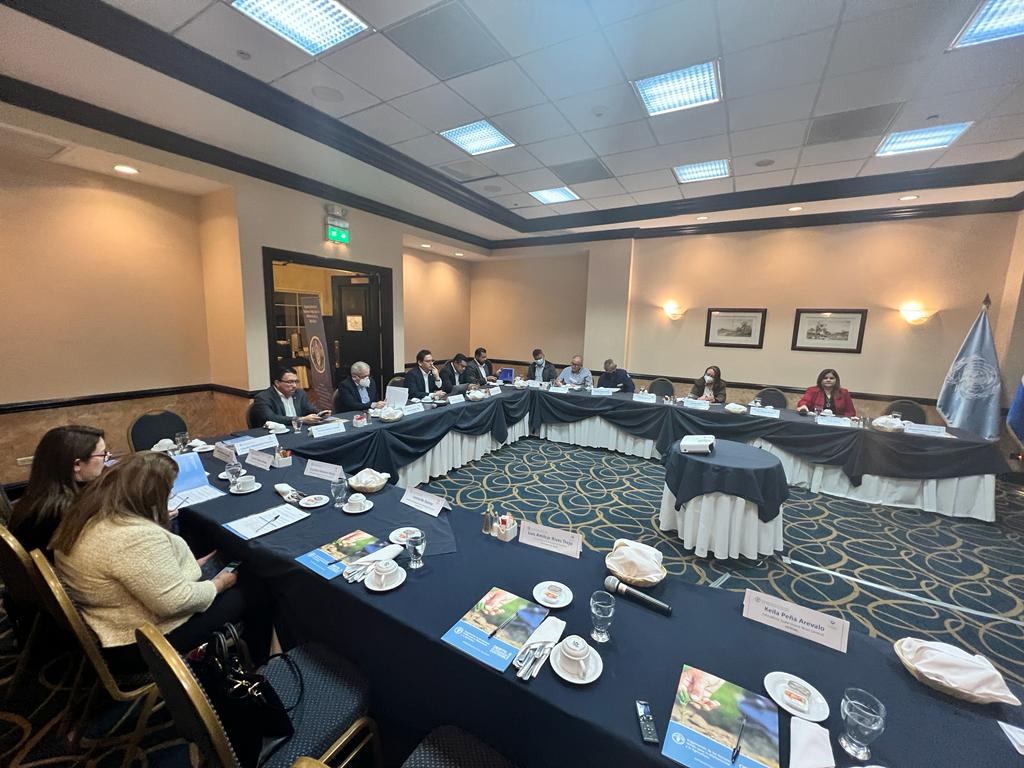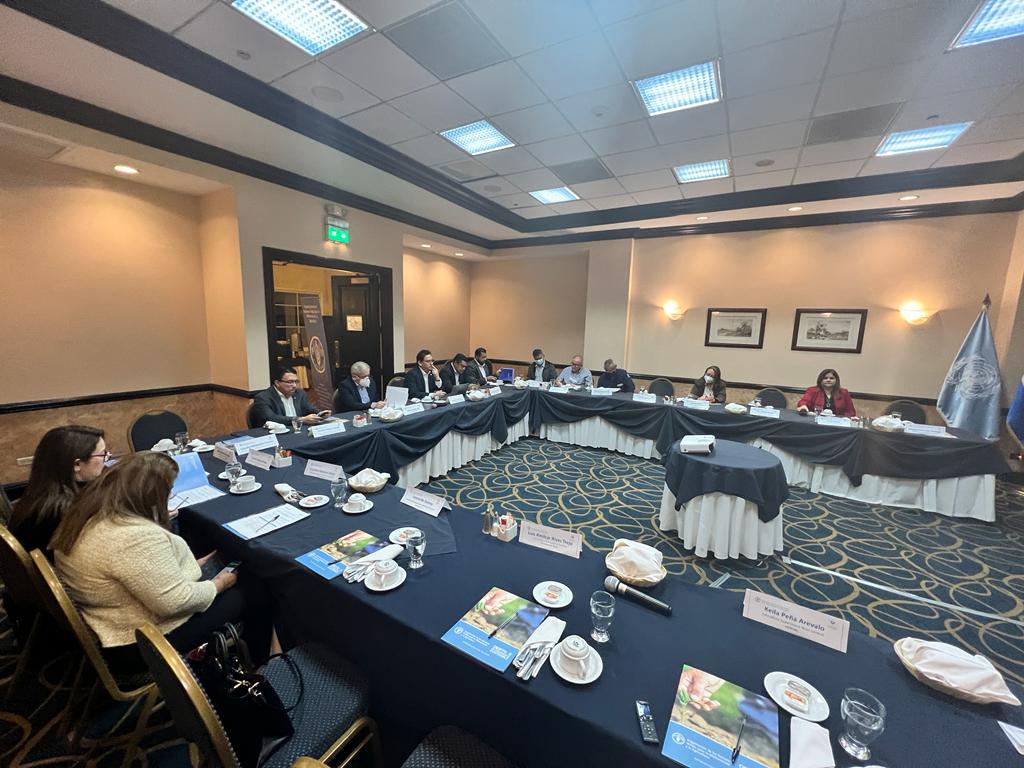Hybrid dialogue included Ministers of El Salvador and representatives of the governments of three LAC countries
December 13, 2022. The main actors involved in the school feeding policy of the government of El Salvador met to discuss the governance of these programmes in Latin American countries. In addition to the Ministers of Education and Agriculture of El Salvador, high-level school feeding managers from Brazil, Guatemala and Paraguay participated. They presented progress, actions developed, obstacles and proposals for improvement implemented within the framework of school feeding governance.
The event ‘Dialogue among countries: Governance of school feeding programmes: main coordination and articulation mechanisms of the related actors’ was developed jointly by FAO El Salvador and the Brazil-FAO International Cooperation, through the project Consolidation of School Feeding Programmes in Latin America and the Caribbean. The activity provided a space for dialogue and exchange of regional experiences regarding the governance of school feeding programmes, addressing issues such as regulatory frameworks, public purchases of food from family farming, food and nutrition education, social participation, among other topics.

Diego Recalde, FAO Representative in El Salvador, opened the event by thanking the participants and highlighting the importance of discussing the draft school feeding law in the country. “A law guarantees this type of programme the legal support to have technical and financial resources and stability,” he said. “We have seen in numerous countries that, when there is a law that supports the programme, we have sustainability”.
The Government of El Salvador is currently working on a draft law to present to the Legislative Assembly, which would give sustainability to the School Food and Health Programme. In addition, it would be an opportunity to promote purchases from smallholder farmers, so that schools have access to fresh, varied and nutritious food for girls, boys and adolescents.
As a representative of the Government of Brazil and the Sustainable School Feeding Network (RAES), Paola Barbieri, project analyst for the Brazilian Cooperation Agency (ABC/MRE), reaffirmed the commitment of the Brazilian Government to Trilateral South-South Cooperation in school feeding. She highlighted the role of the RAES Network in favoring these moments of dialogue, dissemination of experiences and good practices, which contributes to the consolidation of this policy throughout the region.
The Minister of Education of El Salvador, José Mauricio Pineda, said that the Government is increasing the funds allocated to feed girls and boys in schools and that there is a commitment to work on a law that makes the programme sustainable. He commented that a law is an opportunity to strengthen the coordination and articulation of the actors, defining roles and functions, and added that learning about successful experiences from other countries in the event was very productive.
The Minister of Agriculture and Livestock of El Salvador, Enrique Parada, explained that expanding and improving the school feeding programme also implies addressing the supply of products. In this sense, the programme can offer an opportunity for smallholder farmers, highlighting the need for good coordination to meet the great demand of the programme.
Jorge Ulises Gonzáles, FAO regional consultant and expert in school feeding, presented lessons learned from the advances and challenges faced by the school feeding policy in LAC in recent years, reinforcing the need for institutionality, adequate budgets and the generation of evidence of the benefits of this policy. He stressed that the Sustainable Schools methodology, developed by the Brazil-FAO International Cooperation, is an important space in the policies of the countries that approved school feeding laws.
Experiences
During the dialogue, moderated by Najla Veloso, coordinator of the project Consolidation of School Feeding Programmes in Latin America and the Caribbean, the participants from Brazil, Guatemala and Paraguay answered questions about the elements for governance of sustainable school feeding programmes, indicating necessary actions to guarantee the articulation of actors in the execution of the various components of school feeding.
Hugo Tintel, Director of the Student Welfare Directorate of the Ministry of Education and Sciences of Paraguay, affirmed that the contact with successful experiences from other nations was very positive for his country. “RAES is a strategic alliance. Paraguay has learned this in this journey and needs experiences from your countries and from you to continue growing”, he said, highlighting the importance of raising awareness and strengthening the professionals that manage school feeding.
From Brazil, Renata Mainenti Gomes, Coordinator of Social Control of the National Fund for Educational Development (FNDE), indicated some points for good governance: coordination and leadership; clear and defined strategy in the programme, in association with family farming; implementation of food and nutrition education (FNE); definition in law of the attributions and responsibilities of each actor; intersectoriality and dialogue with other institutions. She also presented lessons learned and elements for improvement, as well as recommendations for staggering public purchases of fresh food for school feeding.
From Guatemala, Liliana Isabel Ventura Ramírez, General Director of the General Directorate for Strengthening the Educational Community (Digefoce-Mineduc), commented on the need for strategies at the national and departmental levels to permanently support and accompany family farming. She also said that it is very important to scale up successful experiences to guarantee the link between family farming and school feeding.
Luis Alonzo, administrative deputy director of the Ministry of Education of Guatemala, added in his talk about the importance of the School Feeding Law to have technical and financial resources that allow the stability of the school feeding programme in the country.
Najla Veloso, coordinator of the project Consolidation of School Feeding Programs in Latin America and the Caribbean, concluded the panel by emphasizing that, based on the experiences of the countries, the keywords for good governance in school feeding should be: multisectoral articulation , participation, dialogue, horizontality, interaction, cooperation and clarity of the roles and responsibilities of all the actors in the implementation of the policy. Finally, she highlighted that it has become very important to promote dialogue with the key actors of the countries about the elements for efficient governance of the school feeding policy.
The event was recorded and it is available here:
https://fao.zoom.us/rec/share/JKCZfGwMkUU8puTBMqgT7otCgFuI-8H5Ck2fSXFtvRq1ds2Uwj62TA5NxB9Ff-fq.2_KyChc2hMU_hsEq
Passcode: v*6L+HjD



